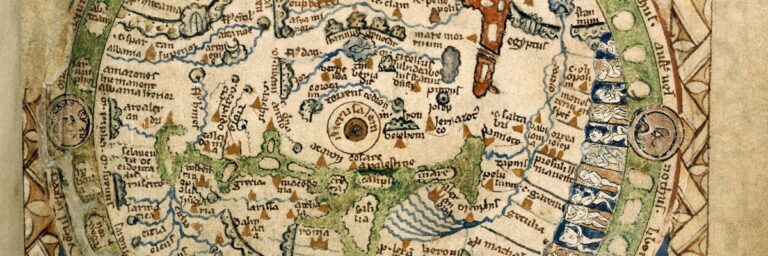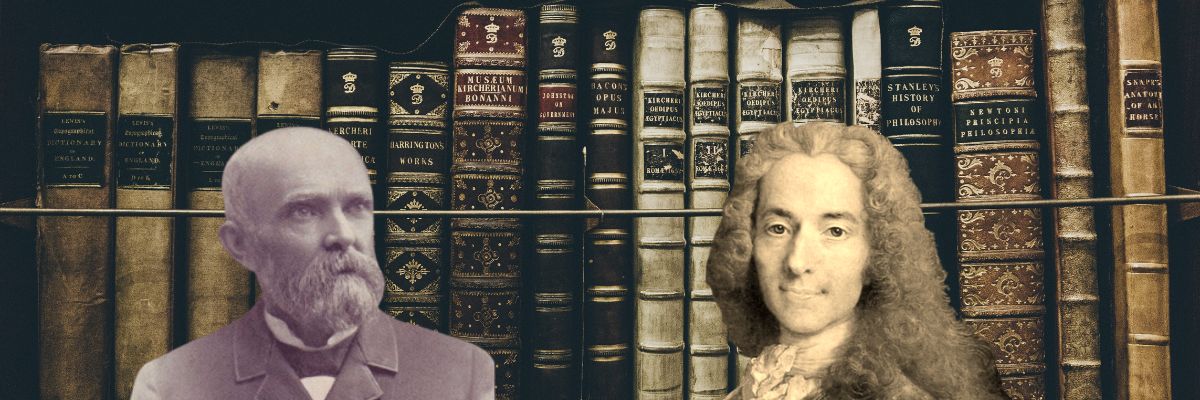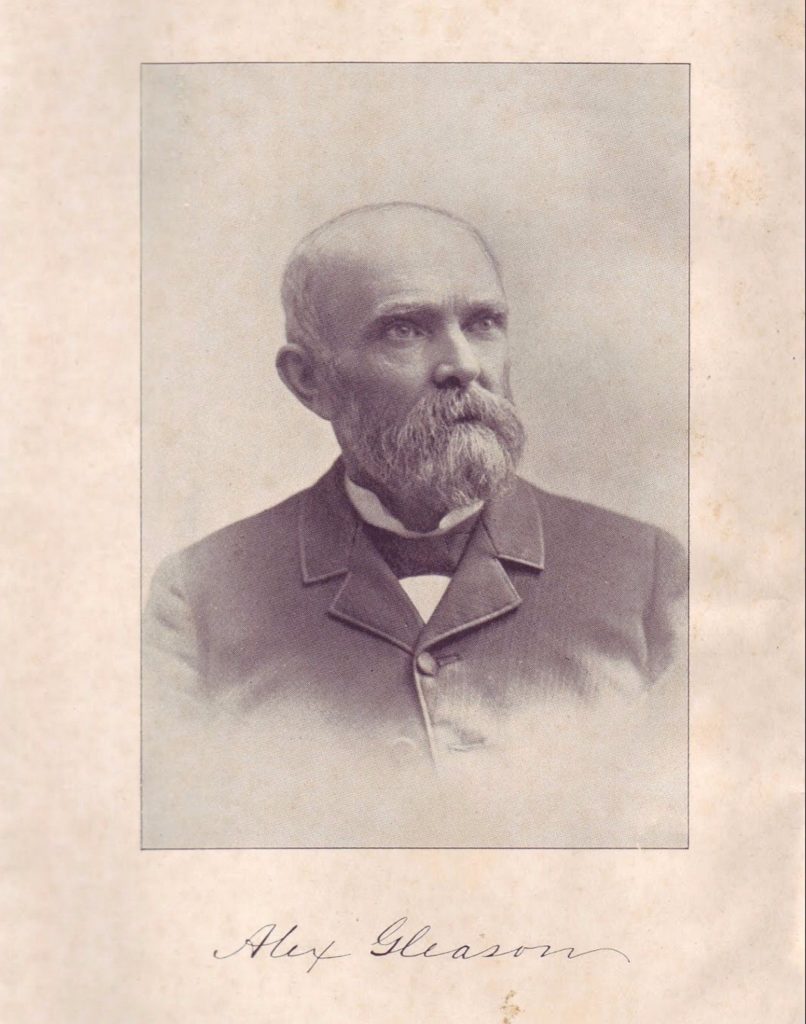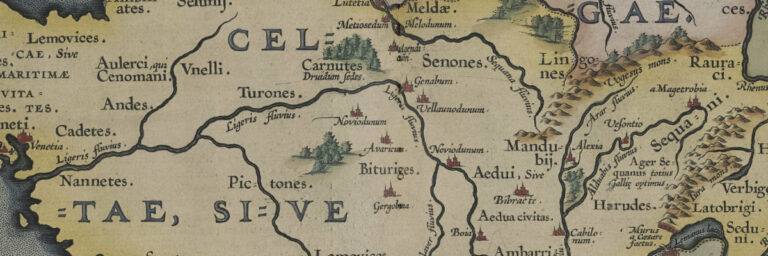
The Psalter World Map of the 13th Century: Unveiling mysteries of the medieval world.
The Psalter World Map, a medieval marvel, intertwines art, faith, and geography, offering a unique window into the medieval worldview.

The famous French philosopher Voltaire was described by Gleason as one of the key “infidels” attacking the meaning of Biblical Scripture throughout the seventeenth century.
An extract from Alexander Gleason’s Book – Is the Bible from Heaven? Is the Earth a Globe?
“Among the modern historians of Continental Europe Voltaire is the most widely known. His writings show great literary skill, with the power of quick, but not very deep penetration. His pen is often guided by a humane and enlightened philosophy, but it is as often misled by strong partialities. He exhibits, to an undue extent, his systematic hostility against established opinions and forms of society, in which he does not scruple to employ the arts of misrepresentation. “Goodrich’s History of All Nations.
Perhaps it is but justice, and therefore due to the apostle of European infidelity and his American admirers, to give a short biographical and yet synoptical description of the accompanying character. The record which we here give sketches of will be found in Encyclopaedia Americana, article Voltaire. “ His influence was felt fhroughout Europe; and never did a man, by the force of his writings, obtain such power over his nation.
Voltaire was born at Chatnay, near Paris, February 20, 1694. His father wished to see him a lawyer and advocate, but his love of literature and general study did not allow him long to devote himself to the law.
He wrote poetry continually, and cultivated his talents in the company of men of much accomplishment and wit, but of little principle; such as Chaulieu, the Marquis de la Fare, Marshal Villars, the Grand Prior of Vendome, the Prince of Conti, and others. He caught the tone of polished society which distinguishes his writings and which greatly contributed to his influence.
His father was displeased with his mode of life and entreated the Marquis of Chateauneuf, French Minister to Holland, to take the young Voltaire with him as a page.

He consented, but Voltaire fell in love with the daughter of Madame Noyer, a refugee in Holland,
and was therefore sent back to his family. In 1716 he was imprisoned in the Bastille on the charge of having written a satire against the Government.
He remained in confinement a year and a half, and, in this situation, planned a poem upon the League, the result of which was the Henriade. He likewise improved the tragedy ‘AEdipus , ’ which was brought upon the stage in 1718, and was performed forty-five times in one year. Meanwhile, the poet had been released from prison in consequence of the real author of the satire having disclosed himself, but had been banished from Paris. In 1726 Voltaire was again imprisoned, at the age of thirty-two, in the Bastille.
He consented, but Voltaire fell in love with the daughter of Madame Noyer, a refugee in Holland,
and was therefore sent back to his family. In 1716 he was imprisoned in the Bastille on the charge of having written a satire against the Government.
He remained in confinement a year and a half, and, in this situation, planned a poem upon the League, the result of which was the Henriade. He likewise improved the tragedy ‘AEdipus , ’ which was brought upon the stage in 1718, and was performed forty-five times in one year. Meanwhile, the poet had been released from prison in consequence of the real author of the satire having disclosed himself, but had been banished from Paris. In 1726 Voltaire was again imprisoned, at the age of thirty-two, in the Bastille.
In 1728 he was permitted to return to France, where he put his effects into a lottery. By this, as well as by other fortunate speculations (he traded under the name of Du Molin and sent ships to Africa), he obtained great wealth, so that, after he came into the possession of the estates of his father, his income amounted to nearly 130,000 livres, which he employed in a praiseworthy manner; he particularly aided youthful literary talent. In 1730 he brought the tragedy of ‘Brutus’ on the stage. He afterwards attacked the pretensions of the Church with such vehemence in his Lettres Philosophiques that the Parliament of Paris condemned the book to be burnt, and an order was issued for the arrest of the author. He thereupon passed some years in concealment.
He soon returned to his poetry and wrote, in 1736, his Alzire, and, in 1741, his Mahommed… To the clergy he was particularly hostile, on account of their intolerance and persecuting spirit. But he often injured the cause of religion itself while he attacked its servants. His motives, moreover, were not always of the highest kind. ”[Inasmuch as ye have done it unto one of the least of these my servants, ye have done it unto me.—Christ.]“ At the advanced age, February, 1778, he returned once more to Paris. Here he found admirers and bitter enemies. He was sensible of the dislike entertained
towards him, and therefore when stopped by the officers of the customs with the inquiry if he had any contraband goods with him, he replied: ‘No, no; there is nothing contraband here but myself. ’ The inquiry of the King, on his arrival, as to the decree of Parliament being still in force against him made him uneasy, but nothing further was done to molest him. The actors waited on him in a body. We have come,’ said they to beseech you to inspire us with your odes.’ ‘I live only for you and through you,’ was his answer; ‘
I have come to Paris to find my glory and my grave,’—a proof that he considered his dramas as his chief productions [of life], and, in truth, dramatic works were his last labors. The circumstances of his death have been related differently, but it is certain that Voltaire died without receiving the sacrament in the eighty-fifth year of his age, May 30, 1778. The Archbishop of Paris is said to
have denied the corpse Christian burigl, and it was therefore interred secretly at Scellaires, a Barnardian abbey, between Nogent Troyes. By a decree of the National Assembly (1791) his remains were placed in the Pantheon, in Paris.
“The exterior of Voltaire was quite characteristic. In his countenance, as has been said, there was a mixture of the eagle and the monkey; and, in character, he exhibited the, boldness of the one with something of the malice of the other. Dupont has lately published an edition of Voltaire’s works, in seventy volumes. A tolerably complete but perhaps not entirely impartial review of the numerous literary contests of Voltaire is given in the Tableau Philosophique de L ’ Esprit de M. d Voltaire (Geneva, 1771.)”

Alexander “Alex” Gleason was an author, and cartographer residing in Buffalo, United States.
Gleason was a devout religious man and had absolute conviction that the heliocentric model of the Earth wasn’t proven, lacked evidence, and conflicted with Biblical scripture.
Find out more about Gleason and his famous 1892 map of the world.

The Psalter World Map, a medieval marvel, intertwines art, faith, and geography, offering a unique window into the medieval worldview.

The Gallia Vetvs 1590 map is a historical masterpiece that depicts the ancient region of Gaul, which is now modern-day France. The map was created

Checking out Castles in Wales – a review of all the castles including ancient ruins with descriptions, prints and maps.
One Response
Gleason’s book is generally in-depth and interesting, although at times they veer off into irrelevant ramblings.